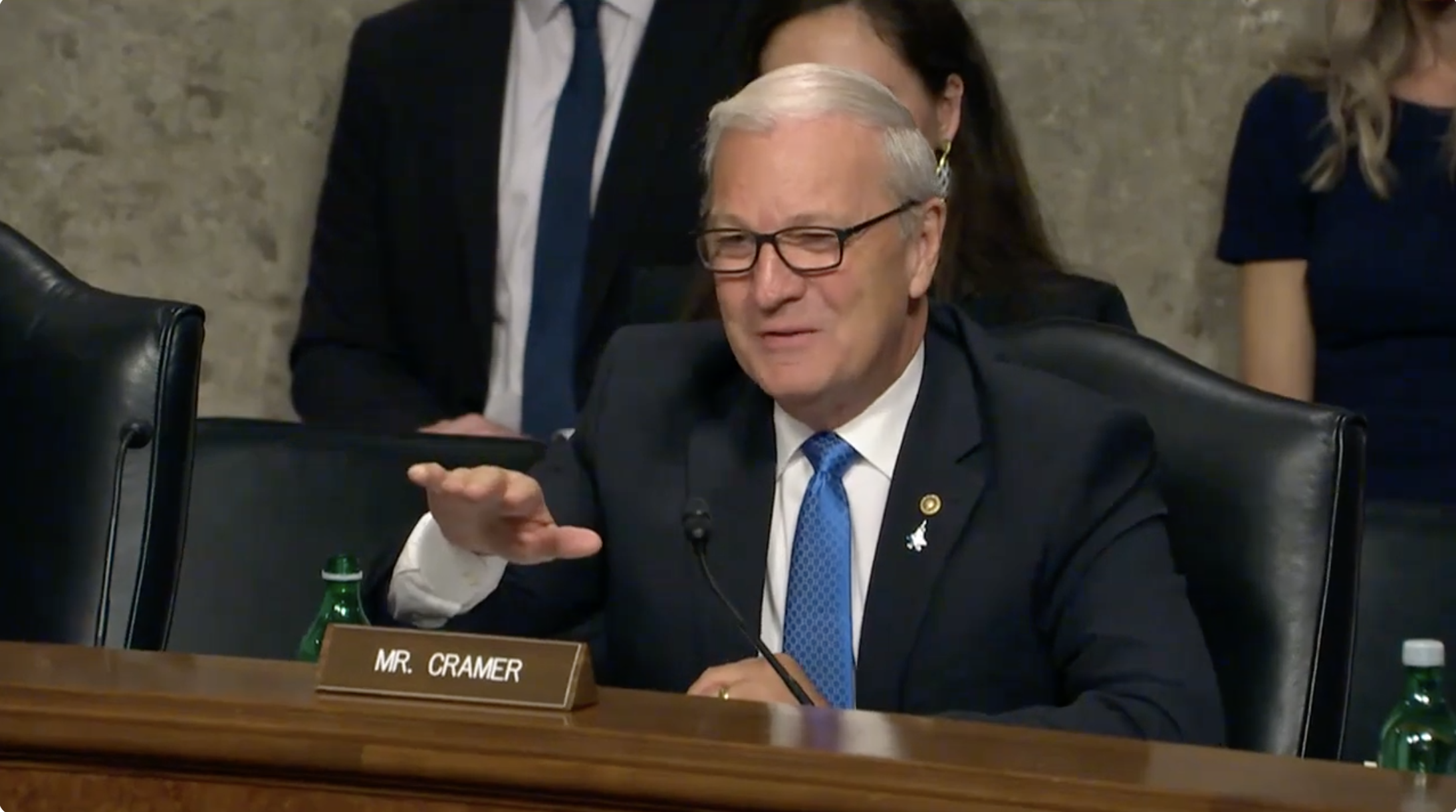***Click here to download video. Click here for audio.***
WASHINGTON – U.S. Senator Kevin Cramer (R-ND), during a Senate Armed Services Committee (SASC) hearing, questioned the Chair and Vice Chair of the Congressional Commission on the Strategic Posture of the United States, Madelyn Creedon and former Senator from Arizona, Jon Kyl.
The Commission is responsible for conducting a review of the United States’ strategic posture. This includes a comprehensive worldwide threat assessment and detailed analysis of nuclear weapons policy, strategy, and force structure, as well as factors impacting the strategic capabilities of our adversaries.

The Commission’s key recommendations focus on going beyond the current program structure which will replace our aging nuclear arsenal with more capable systems. The current modernization program must be expanded to ensure U.S. nuclear strategy is effective enough to deter our two nuclear peers, Russia and China.
Senator Cramer began by thanking Ms. Creedon and Senator Kyl for the incredible work they have done on the Commission and then stated how non-nuclear deterrent options (i.e. conventional warfare) are an essential part of our nuclear deterrence by preventing further escalation. Senator Cramer then expressed his concerns regarding our priorities and responsibilities to defend our nation and educate the American people about the emerging nuclear threats from our adversaries.
“Do we make a mistake when we take the number one priority of nuclear modernization, the number one priority of the number one priority in terms of our responsibilities of securing the nation, defending the nation and silo its budget in the services rather than set it apart as the number one priority of defending this country?” asked Senator Cramer. “Because I worry a little bit that the priority of nuclear modernization, particularly in this high inflation, fast inflation moment we live in, means we're going to modernize our nukes, our deterrent, at the expense of non-nuclear. Silos are a common problem for me, frankly, in the Pentagon. Should we be looking at finding a better way, a more transparent way, to demonstrate the cost of all of this and not cannibalize non-nuclear defenses by modernizing nuclear?”
“Our commission actually makes several recommendations that go to your point. First thing I would say is in talking about strategic deterrence, we're not just talking about nuclear. We believe the first thing we've got to do is have a conventional capability, which is so dominant that no party would ever consider a nuclear attack against the United States,” said Senator Kyl. “So, we hope to avoid war with our conventional capability, that shouldn't be sacrificed in any way, but if you don't have the ultimate weapon, that nuclear dominance, then you don't have that element that underpins all of the rest, and that's why our Secretaries of Defense have said it's the number one priority. In many ways, our government hasn’t backed that up.”
Mr. Kyl then recommended three actions Congress can do internally to re-emphasize the importance of the nuclear deterrent. His recommendations include having more meaningful Congressional oversight and stakeholder input, as well as more engagement with candidates responsible for critical defense and energy programs.
“Finally, I think it's always been a problem, when the [National Nuclear Security Administration] was created, the secretaries of defense, from both parties, have seen that as a stepping on their toes. They would rather retain the jurisdiction within the department, and we're trying to elevate the NNSA head to a higher position within the department to indicate that we believe this is that important. The Secretary of Energy has to acknowledge that NNSA is a silo within the department. It's not under the thumb of the Secretary of Energy. So, there are a lot of different things we say in here, which, if implemented, will help to elevate the work of NNSA and the nuclear enterprise, generally to the position everybody says it has, but doesn't really backup,” said Senator Kyl.
Senator Cramer then wrapped up by highlighting General David Allvin’s recent visit to North Dakota for the UAS Summit and tour of Minot Air Force Base. Senator Cramer and General Allvin met with airmen and toured several sites on the base, which plays a historic and critical role in the defense of our nation, as it is the only base to house two out of three legs of the strategic triad.
“One of the things I worry about in this entire discussion is that we are deteriorating, not just our nuclear deterrent but our reputational deterrent a little bit by having this transparent conversation that we must have. Last week, General Alvin and I were in North Dakota for a couple of days, spent a lot of time at Minot, saw those 60-year-old missiles and the control center and those 60-year-old bombers that are carrying [Long Range Stand Off Weapons]. I just want anybody listening to know, they're still very capable. Be very, be very cautious. We are still very capable while we transition,” said Senator Cramer.